The Effects of Global Warming on Kayak Fishing
Written by The Lost Anchovy
10.28.2021
Introduction
We have heard the saying follow the science; with prominent scientists, pop icons, celebrities, actor and political leaders ringing the siren on our inevitable doom if we do not change course on global warming. But humanity is a large ship…a very large ship, and changing course isn’t as easy as buying a new Tesla to save man kind. However, this article is about Kayak Fishing and the short answer is yes it will affect your Kayak Fishing and sooner than you think.
The science says that the critical tipping point is 1.5 degrees Celsius. This is the point of no return with far reaching environmental consequences that humanity and our super computers will not be able to project. There are too many variables at play to accurately predict the future of our environment and humanities future.
If these projections come to past humanity will adapt or we will not and that will be the end of that. We have seen these dooms day scenario played out on the cinema screens from movies such as The day after tomorrow and numerous others.
However, we are a reactive species and the saying out of sight and out of mind is appropriate here. Most people will not take direct action unless something directly effects them. Something moves them emotionally or a tragedy changes the trajectory of their lives. The point here is…
WE TAKE ACTION WHEN IT DIRECTLY EFFECTS US.
I stated earlier that global warming will effect kayak fishing, and we are seeing it today.
Affects of Global Warming on Kayak Fishing.
With Kayak fishing trending as an industry for nearly a decade with phenomenal growth in peddle, paddle and even recently motorized kayaks, it’s becoming clear kayak plays a prominent role in the recreational fishing industry. I have long been an advocate for Kayak fishing because of the numerous benefits: physical, mental and even spiritual (if you believe in that). I believe Kayak Fishing is the most ecological friendly way to fish that does not increase our carbon emissions, directly or indirectly, to global warming — It is a solution.
Let me address the central question of this informative article.
Is global warming affecting Kayak Fishing?
For those in central and Northern California we have seen these effects first hand. Here is a partial list:
– Bolinas (launch Ramp)/ Rising Tides
– Water temperature has been steadily increasing in the ocean
– Decreasing rain fall (Sturgeon San Pablo Bay)
– Declining Water levels across reservoirs (Bass fishing)/Lake Oroville
– Decrease Salmon Spawns (Water Temperatures)
– Warm water species (Mackerel,Blue Fin Tuna, Thresher sharks)
For years the Marin coast has been a favorite location of mine to go salmon fishing through the summer. It is the closest launch to Duxbury reef, a well known King Salmon hot spot. I consider the surf launch to be most advance beach launch in Kayak Fishing in all of California even before rising sea levels. The beach is exposed during low tide but is highly impacted by a south swell that drives large waves crashing onto the beach. However during a high tides where tidal swings rise above 2 ft the beach disappears and the landing becomes extremely precarious with only a slight opening at the launch wedged between jagged rocks and an unforgiving cement wall. The situation is down right dangerous even for the experience kayak angler as myself.
Where is the beach?
One thing that Kayak Anglers who frequent this area will agree to is the disappearing beach. Historically, the beach can be accessed during low tide however many are witnessing water being push up to the ramp even during low tide — The beach has disappeared. I’m not a scientist or a journalist but rising sea levels seems to be the logical common denominator that can explain this phenomena.
To be truthful I do not know the exact reason for the disappearing beach. However, this video and article offer a compelling case for what is happening.
See this Video and this impact report
Increasing Water Temperatures
Fisherman like me are not scientists, we do not use the scientific method to test out theories and have controls and variable groups to provide evidence to backup our conclusions. We witness first hand what happens in the ocean, add in our personal experiences, and come up with a conclusion that makes its way into fisherman folklore, such as “Bananas are bad luck”, or fish don’t bite during the “Full Moon”. However that shouldn’t mean our experiences should be seen as crockpot fisherman superstition; even the most absurd superstations were once grounded on some truth.
Fisherman: Commercial, Recreational, and Kayak Anglers are seeing an increase in the ocean water temperatures. As a result Pelagic fish that thrive in warmer temperatures such Bluefin Tuna can be seen roaming the outskirts of the Central and Northern California Coast. Last year fisherman were catching Bluefin Tuna a few miles outside of Half Moon Bay, a highly unusual event. The rising sea temperatures have also brought in large schools or Spanish and Pacific Mackerel that are feeding on the anchovy balls around Santa Cruz and Capitola. These warm water species are often seen roaming the kelp beds in Southern California were the water temperature hovers in the mid 60s and 70s degrees. It is highly unusual to see them roaming the central and Northern California coastline.
Warmer waters and the impact on the King Salmon Fishery
If the fishing is good for Bluefin Tuna, Pacific Mackerel and other warm water species, there is the reverse impact on cold water species such as King (Chinook) Salmon. This year the DFGW commission pushed back the recreational and commercial season due to poor salmon returns and fish counts as part of the fish management strategy. It is not a secret that King Salmon thrive in cold water whether it is in the ocean, lakes, rivers or streams — They like cold water. Therefore it is not a surprise that we are seeing the King Salmon population struggle with these environmental fluctuations, even with the help from the fish Hatcheries.
Take for example the abundance of salmon dying in butt creek, along the Sacramento river due to rising water temperatures.
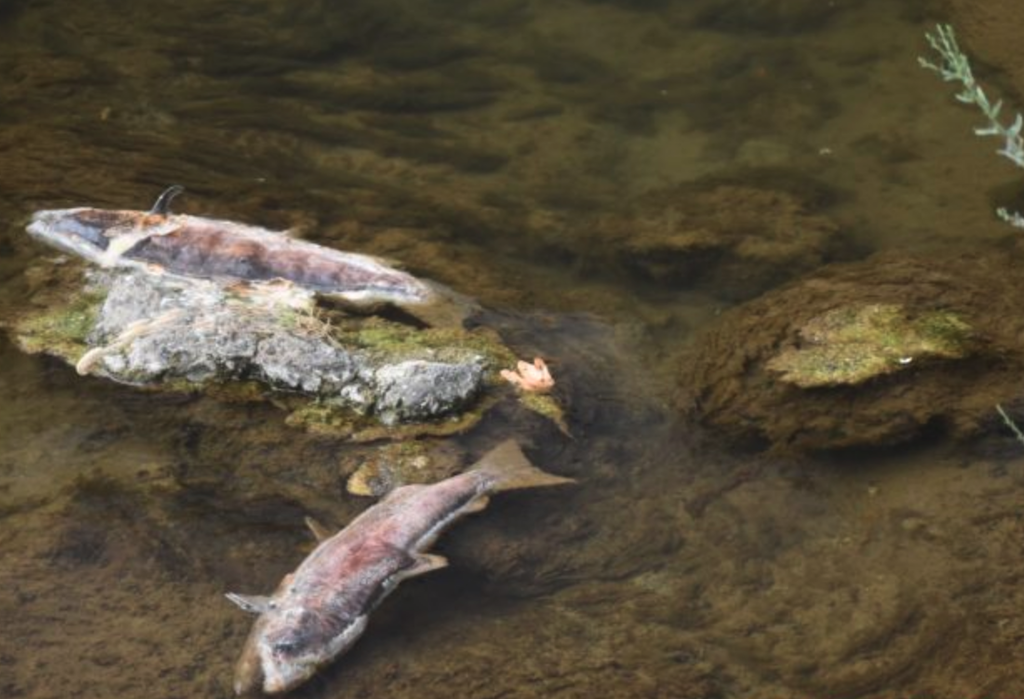
Those who fish King Salmon, ocean or rivers, mostly agreed that the fishing has been difficult this year there just isn’t this same level of fish that we are use to seeing. Many point to a myriad of reasons for the decrease in salmon count but the root cause, environmentalist will argue, is global warming and its various impacts such as the California drought, and unprecedented wildfires raging in the Northwest.
Impacts to San Francisco Bay, Delta, lakes and reservoirs
The California drought is well documented with water districts across the state implementing mandatory water rationing or considering various options to curtail residential and commercial water consumption. The majority of California’s water supply is provided by the run off from the Sierra mountains into the delta and is captured in the lakes and reservoirs in a complex water management system overseen by the various state and local water districts.
The most valued commodity in the near future maybe water if the current projections and conditions continue on its current trajectory. Today we are already seeing the various interest groups fighting for this precious commodity from: Big Agriculture, water districts and to environmentalist working to preserve wetlands, freshwater is becoming the new commodity king.
With the sprint to secure the depleting water supply, presumably human consumption will take precedence over recreational interest. If the 2021-2022 winter season continues to be dry as past winters the repercussion to fishing will be imminent, especially for freshwater anglers who target lakes, reservoirs, and the delta.
Consider this recent photo from Lake Oroville in 2021.
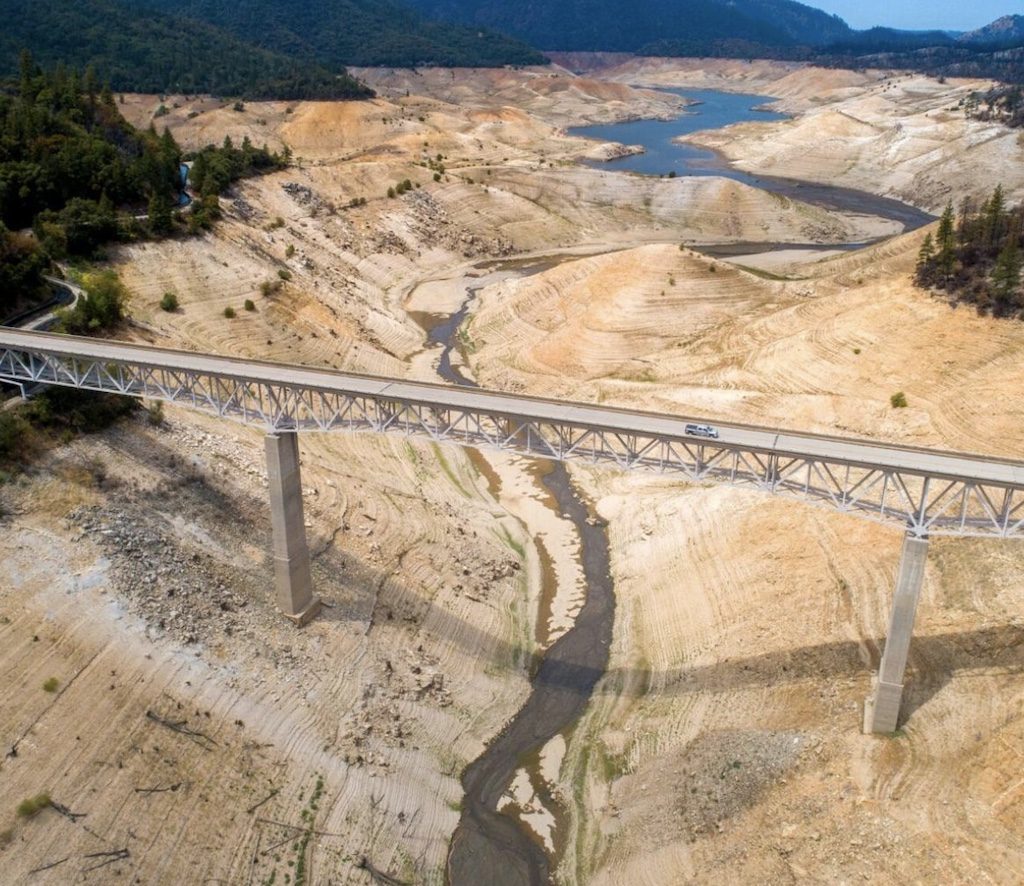
Unfortunately this photograph can be a harbinger of the future of California lakes and reservoirs if winters conditions continue on their current trajectory. There is no sugar coating the reality of what we are facing — a serious water shortage
Solutions and Enviromental Impacts
Take for example, one solution that Marin County Water district is considering — Desalination. Desalination is a successful method of obtaining freshwater for general use, however, like any technology it has its pros and cons such as: High energy usage and potential adverse environmental impacts. One of the environmental impacts is discarding the brine after the freshwater has been extracted through the desalination process.
The solution is to combined the brine with treated waste water and release it into San Francisco Bay near San Rafael. Many who fish San Pablo Bay know that in the winter SPB becomes a sturgeon fishing hot spot. Sturgeon, a prehistoric animal, prefer to reside in brackish water (Brackish water is a term used to describe a mixture of salt and freshwater).
However with the increase in the bay salinity from the desalination process, if the water district approves the desalination option, the impact on the Sturgeon fishing could have a drastic impact to this fishery in San Pablo Bay. Where the sturgeon roam over winter we could see species such as sharks, rays and crabs in abundance rather than Sturgeon.
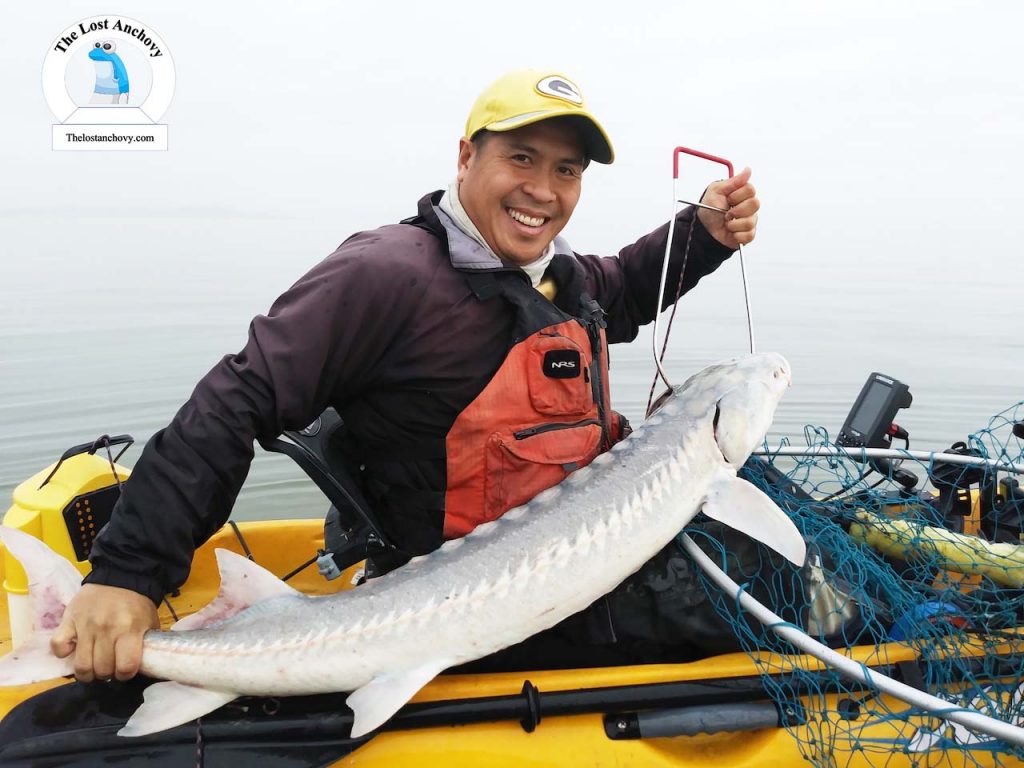
The future of Kayak Fishing in a warmer world
Just like sturgeon who prefer to reside in brackish waters; water temperatures play a key role in different fish species. As fisherman we are keen on how the different temperatures points affect the fish in the sea, rivers and lakes. Here in Central and Northern California, where I live, we are blessed with a mixtures of cold and warm water that produces one of the largest biodiverse regions in all of the world. However, if conditions continue on the current trend we could see a very different fishing world in the near future such as: Species and migrations changes, limited lake and reservoir tournaments, new species such as yellowtail or BFT, and a decline in cold water species such as the King Salmon.
As fisherman we will most likely adapt to the changing conditions and target new species, however it will be a very different world than what we have been accustomed to. We will need to travel farther north or father offshore, or fish deeper in canyons to find the fish that prefer colder temperatures. As kayak anglers the biggest limiting factor is distance which could put some of these species outside our ability to target them without a motor.
Conclusion
I am reporting the facts as I see them, from my own personal experiences, and from my own research. My disclaimer is I am not a scientist, marine biologist, or government official; nor is this article intended to be political in any form, or advocate on any position on climate change.
Alas, I am Lost Anchovy whose pressing priority is to stay alive before the next wave of hungry salmon, halibut of rockfish decide to make me a meal however, I think the best thing we can do as recreational fisherman is exactly what we are doing right now which is — Kayak Fish. Human powered Kayak fishing is the Tesla of the boating world that produces zero carbon emissions. Kayak fishing is one solution to combating global climate change because it allows us to do what we love to do — FISH! With minimal environmental impacts. I have long been an advocate for the Kayak fishing because of the tremendous benefits. So continue to do what you are doing; go catch fish, go catch many fish, go catch different fish, on your Kayak! Who knows…maybe our collective action will help reduce that 1.5 degrees to stave of world calamity, and who knows… maybe that fish of a life time will be your reward for doing your part in combating climate change.
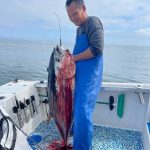
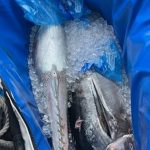
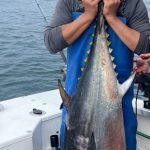
Well said on all points. Hopefully mankind can make enough changes in and out of the water to keep us from getting to that tipping point.
We eventually will catch warm water fish in HMB a just a few years. Wow, great article. Keep have them coming.